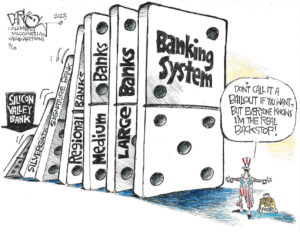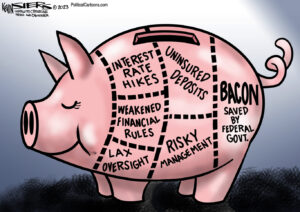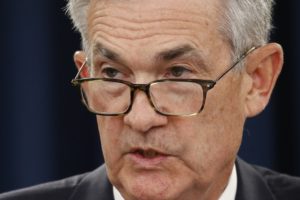A Republican to Save Us
You probably don’t know much about Sheila Bair, but she is looking out for you, and that is why the big guys on Wall Street and their allies in the Obama administration are out to get her.
You probably don’t know much about Sheila Bair, but she is looking out for you, and that is why the big guys on Wall Street and their allies in the Obama administration are out to get her.
Bair is the Republican whom President Obama reappointed to head the Federal Deposit Insurance Corp., but she is protecting the interest of taxpayers as no Democrat has in this administration, and she needs your support. Huge financial decisions are being made by this government, involving trillions in future obligations of U.S. taxpayers, and Bair has been a rare effective voice for the interests of ordinary folk.
Once an aide to then-Sen. Robert Dole (R-Kan.), Bair was appointed by the first President Bush to the Commodity Futures Trading Commission and reappointed by President Clinton. Later she was named head of the FDIC by President George W. Bush. Throughout her public service she has proved to be a vigilant protector of consumer interests.
Bair angered people on both sides of the political aisle by repeatedly raising questions about the radical deregulation policies that unfettered Wall Street’s greed. She has been a great watchdog of the public’s interest. That was acknowledged recently when she and former CFTC Chair Brooksley Born, the prescient hero who warned most clearly of the coming debacle, each won a John F. Kennedy Library “Profile in Courage” Award.
Bair has continued to show courage in her work. As The Wall Street Journal noted: “The FDIC’s influence has grown in the past year because of Ms. Bair’s willingness to challenge her peers, as well as her agency’s central role responding to the financial crisis. Ms. Bair warned about the housing crisis before many of her colleagues.”
The current point of conflict between Bair and the hacks who got us into this mess — and who have resurfaced as the key players running the bailout — is financial industry accountability. She started demanding that accountability last fall when the Bush administration began the TARP bailout and she continues to do so under Obama. Throughout, her nemesis has been Timothy Geithner, former head of the New York Federal Reserve Bank and now secretary of the treasury.
The most glaring example of this conflict has been the battle over the management of Citigroup, the “too big to fail” banking conglomerate that became the largest in the world thanks to changes in the law advocated by Clinton Treasury Secretary Robert Rubin. Rubin then left the government to become chairman of the executive committee at Citigroup, a post he occupied as it made risky bets on derivatives and incurred record losses. Citigroup was saved from oblivion by a plan engineered by Geithner, whom Rubin had successfully pushed for the top job at the New York Fed.
That plan, endorsed by the Bush administration, left the U.S. government pumping $50 billion into Citigroup and guaranteeing an additional $300 billion of its “toxic” holdings. In return, we taxpayers were to receive preferred stock with the promise of significant interest payments, but now the terms have been changed. Thanks to Geithner’s intervention, Citigroup will be allowed to convert half of the government’s preferred stock into almost worthless common stock.
Enter Bair, who has been insisting, over Geithner’s objection, that major changes occur in the leadership of Citigroup to give the taxpayers a better chance to get some of that money back. She has an obligation to make that demand because the FDIC is a part guarantor not only of Citigroup banking deposits but also of the $300 billion toxic assets package.
In her role of protecting the taxpayer interest, she has been pressing for replacing Citigroup CEO Vikram Pandit or at least more fully overseeing his performance. He took over Citigroup in December 2007, and while he now claims to be committed to reforming his bank’s operation, as The Wall Street Journal concluded, “For his first year on the job, Mr. Pandit insisted Citigroup’s business model was basically sound.”
Bair didn’t believe that the model was sound, and she has doubts about the ability of Pandit and other top banking executives to change their high-roller ways. As David Weidner put it on MarketWatch, “By threatening the things most precious to bank executives—their pay and jobs—she has sent a clear message to the industry: Your bailout is not without a price. We expect results.”
But, he added ominously: “Bair’s hardball tactics aren’t just irritating bankers, though. She’s also making enemies of career bureaucrats and Wall Street sympathizers. Treasury Secretary Timothy Geithner … reportedly tried to push out Bair before he took office in December.”
Rest assured, if Bair loses out and Geithner has his way, Citigroup’s CEO and the other Wall Street moguls will be thrilled. But the public will have lost its most effective advocate.
Your support matters…Independent journalism is under threat and overshadowed by heavily funded mainstream media.
You can help level the playing field. Become a member.
Your tax-deductible contribution keeps us digging beneath the headlines to give you thought-provoking, investigative reporting and analysis that unearths what's really happening- without compromise.
Give today to support our courageous, independent journalists.







You need to be a supporter to comment.
There are currently no responses to this article.
Be the first to respond.